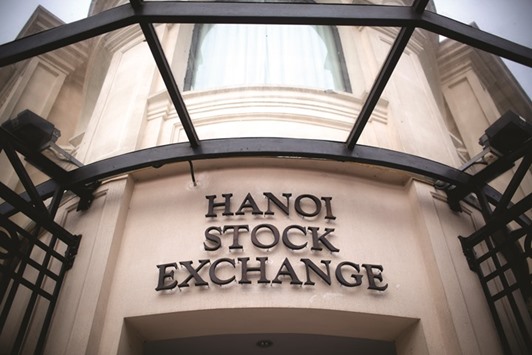Vietnam plans to start trading in its new derivatives market in May with an initial offering of stock-index and government-bond futures contracts, according to a Hanoi Stock Exchange official, as the country seeks ways to appeal to offshore investors.
Long-term plans include options contracts, Nguyen Anh Phong, deputy general director at the Hanoi exchange, said in an interview. The bourse will manage the trading of the new venue and two indexes are being considered, he said, though the government has yet to make a decision on which one will be used at first.
Former Prime Minister Nguyen Tan Dung approved a derivatives market for Vietnam in 2014. The aim is to make the country’s 17 year-old equities market more appealing to foreigners by introducing the ability to hedge. By joining countries in the region, including Singapore and Thailand, that offer futures contracts, local officials are also trying to improve Vietnam’s standing with index-compilers.
“We hope that with other measures that are being made, Vietnam will be considered to upgrade into emerging-market status in part because of the derivatives market,” Phong said.
Vietnam opened its stock market in July 2000 with just two listed companies. Today there are more than 700 public firms on two exchanges with a combined market value of $99bn, according to data compiled by Bloomberg.
Refrigeration Electrical Engineering Corp, one of the first two companies, has a market capitalization of 8.6tn dong ($377mn). The biggest company by market value is Vietnam Dairy Products, the country’s largest dairy producer. The government sold part of its stake in Vinamilk late last year in a long-awaited divestment, a move partly made to provide attractive shares for offshore investors.
With overseas investors accounting for less than 20% of the market, the country has been taking steps to win more international business. Measures included lowering foreign-ownership limits for some industries and selling shares in state-owned companies. Speeding up sales of government stakes in more companies is another item on the agenda.
Merging the country’s two exchanges is also under consideration, in an effort to consolidate the market, the Vietnam News newspaper on reported March 10, citing the chairman of the State Securities Commission.
The derivatives market will start with contracts tied to one of two indexes: the VN30, which comprises the 30 largest stocks by market value on Ho Chi Minh City Stock Exchange, or the HNX30, which contains the 30 biggest companies listed in the Hanoi Stock Exchange. The State Securities Commission will make a decision soon, Phong said.
The benchmark VN Index of Vietnamese stocks is up 7.8% this year, following an advance of 15% in 2016, and reached a nine-year high on February 23. The measure rose 0.1% yesterday.
Officials have consulted experts from international organisations, including the Nomura Research Institute and the Deutsche Gesellschaft für Internationale Zusammenarbeit (GIZ), Phong said. They have also sought advice from exchanges including Bursa Malaysia, and bourse operators in Taiwan, Thailand and Japan, he said. The new market will be managed by the Hanoi bourse for trading, while clearing and settlement will be under Vietnam Securities Depository.
“There are many investors not investing in Vietnam because they don’t have the possibility to hedge their exposure if something happens, and they want to get out of the market quickly and easily, which through index futures should be possible.” said Thomas Hugger, Hong-Kong based chief executive officer of Asia Frontier Capital.
Not everyone is convinced about the derivatives market’s potential. Michel Tosto, head of institutional sales and brokerage at Viet Capital Securities, said the popularity of new contracts is in question because local investors need to learn more about futures trading and adjust their strategies before participating.
“I don’t think it’s going to be a rush because some funds have mandates that do not allow them to invest in derivatives market,” said Ho Chi Minh City-based Tosto, whose firm is the country’s third-largest brokerage.
A 49% cap for overseas holdings of Vietnamese-listed companies, 30% for banks, was in place until 2015, when the government issued rules scrapping the curbs in some industries. Implementation has been rocky, however, and companies and investors are unclear on the limits for specific industries and firms. The foreign cap at banks remains, though Prime Minister Nguyen Xuan Phuc said in January it would be raised, perhaps this year.

A frontal view of the Hanoi Stock Exchange building. Vietnam plans to start trading in its new derivatives market in May with an initial offering of stock-index and government-bond futures contracts.
